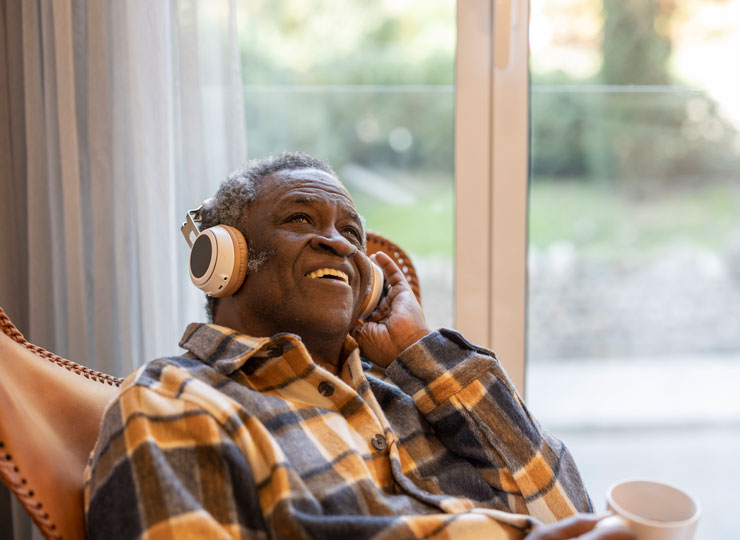
April 19, 2023
Music may help to ease the stress of living with advanced Alzheimer’s disease, according to a new report. Nursing home residents with dementia who listened to enjoyable music showed fewer signs of agitation, aggression and other behavioral issues than residents who didn’t get the music intervention. The findings underscore the potential role of music therapy in helping to aid the care of those with Alzheimer’s disease.
For the study, researchers in Germany enlisted 90 nursing home residents with severe Alzheimer’s disease and other forms of dementia. Most were in their mid-80s.The study authors were inspired, in part, by a moving documentary called “Alive Inside,” about the powerful effects that music can have on people with Alzheimer’s disease. (You can learn more at http://www.aliveinside.us/ )
About half the participants were randomly assigned to a musical intervention group, in which they listened to a playlist of carefully selected music several times a week. With music therapy, music is chosen based on that person’s personal preferences prior to the onset of dementia. Someone in their 80s, for example, might prefer listening to music from their youth, sung by artists like Frank Sinatra or Judy Garland, versus the latest rap or electronic dance music. Talking with family members about a person with dementia’s musical tastes can help caregivers to select music that is enjoyable and personally meaningful to them.
The other half did not get the music sessions and served as controls. Researchers observed participants before, during and after listening to their favored music. They looked for signs of behavioral or psychological issues common in people with advanced Alzheimer’s disease, including depression, aggression, agitation and disorientation.
The researchers found that nursing home residents who got the music sessions showed fewer behavioral issues while listening to music compared to their peers who did not listen to music. Benefits were modest, but significant. Improvements in behavior, however, were somewhat short lived, dissipating soon after the music session was over.
The authors say that the findings are consistent with earlier studies showing that music therapy can be an effective, drug-free way to help ease the agitation of Alzheimer’s disease. This trial differed from many earlier music intervention studies in that it looked at patients in nursing homes with more advanced disease. Even in the severe stages of Alzheimer’s, the researchers found, music provided benefits.
Nursing home residents are often given powerful anti-psychotic drugs to help ease behavioral issues like aggression and wandering. But these drugs have potent and potentially dangerous side effects. Music is a much safer way to soothe an agitated or anxious person with Alzheimer’s disease.
The authors note that music therapy can be integrated into the everyday care routines of people with Alzheimer’s disease as a way to help ease the burden of caregiving. The findings were published in the International Journal of Geriatric Psychiatry.
Music-based therapies help to stimulate positive memories and reduce stress. Experts say that music is a way of communicating with patients even in the advanced stages of Alzheimer’s disease. Many people with severe Alzheimer’s cannot understand spoken language well, but they can respond to a familiar melody or song from their past. Listening to favorite music can help people with dementia focus and tune out outside stimuli that may be unfamiliar or upsetting. The pleasant feelings and memories elicited by the music can in turn help ease the agitation so common in people with Alzheimer’s disease. By improving challenging behaviors, music can also help to ease the burden for caregivers.
Music therapy can also be used at home. Pick songs or music that is familiar and enjoyable for the person with Alzheimer’s disease. Playing favorite music or songs from their childhood or young adult years may be particularly soothing.
Many senior care centers and Alzheimer’s support groups hold music and sing-along sessions in communities nationwide. And for those that don’t, integrating a music program into a community center, nursing home or your own home may be an invaluable addition to caring for anyone with Alzheimer’s disease.
Other tips for music and the person with Alzheimer’s include:
- Choose music to set the mood you’re hoping to create. Quiet music may be suitable before bedtime, whereas soft but upbeat tunes may be appropriate for a special birthday celebration.
- Avoid music that may be too loud or interrupted by noisy commercials. Too much stimulation can cause confusion and agitation. Turn off the TV if music is playing to avoid overstimulation.
- Encourage those with Alzheimer’s to clap or sing along or play a musical instrument. Supplement music with fond reminiscences and family photos.
By ALZinfo.org, The Alzheimer’s Information Site. Reviewed by Eric Schmidt, Ph.D., Fisher Center for Alzheimer’s Research Foundation at The Rockefeller University.
Source: Mareike C. Hillebrand, Lisette Weise, Gabriele Wilz: “Immediate effects of individualized music listening on behavioral and psychological symptoms of dementia: A randomized controlled trial.” International Journal of Geriatric Psychiatry, February 25, 2023











